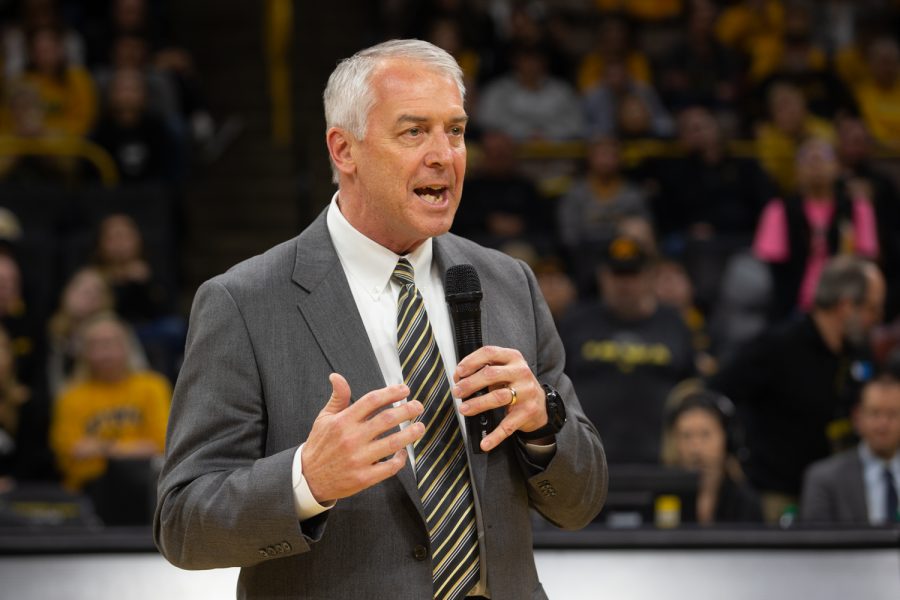Barta speaks on new role in CFP and more
Gary Barta spoke with the media on Monday to answer questions about his new role in the College Football Playoff and more.
University of Iowa athletic director Gary Barta discusses former Iowa basketball player Megan Gustafson’s career during the retirement ceremony for her number 10 jersey following the Iowa women’s basketball game against Michigan State University on Sunday, Jan. 26, 2020 at Caver-Hawkeye Arena. The Hawkeyes defeated the Spartans, 74-57.
February 3, 2020
For the first time since being named the chair of the College Football Playoff committee, Iowa Athletics Director Gary Barta took to the podium to discuss his new role among other items.
Barta, who was named the CFP chair on Jan. 22, will take over for Oregon Athletics Director Rob Mullens.
In his new role, Barta will serve as a spokesperson for the other committee members.
Serving as the chair, Barta said, allows him to give back to a sport that changed his life, which played a role in accepting the position.
“If I didn’t play football — I was a first-gen college student and my family had no money, so there was no reasonable person who thought I’d go to college,” Barta said. “So, if it weren’t for that opportunity, I wouldn’t be standing before you today. Football has given me unbelievable opportunities. It was a chance when they asked me to be on the committee to say, ‘I’d love to give back.’”
Barta said he still his vote still holds the same weight as the rest of the committee members, but he will have to be on the road more often when football season comes along and the College Football Playoff committee hits it stride.
Members representing a university — like Barta at the University of Iowa — cannot be in the room when their programs are discussed.
Instead, the group uses white hats with no logos as a symbol for finding the best teams in the country.
“Before you go into the room, you hang your hat,” Barta said. “Symbolically, it’s just a commitment from everyone in the room to look to name the best 25 teams, the top four, and to do so without putting the bias against the teams that you might be closest to or know the most about.”
Talking name, image, and likeness
Barta also used his time to speak on some hot-button issues within the college athletics community.
Although he didn’t go in-depth, Barta rattled off some of his thoughts on student-athletes’ ability to use their name, image, and likeness.
The state of California has already passed a bill that doesn’t put limits on what a student-athlete can make with their name, image, and likeness.
Iowa senators introduced a similar bill in January.
Barta said he thinks most Americans are opposed to having college athletics go away or having student-athletes become employees, noting a line that could be crossed.
“The challenge or the concern is when does it become name, image, and likeness, and when does it become boosters wanting to get involved in the recruiting process?” Barta said. “There’s certainly a discomfort and concern about that.”
Talking transfers
When discussing transfers, Barta mentioned that each waiver application comes with a unique set of personal reasons for changing schools.
The Big Ten Conference, Barta said, has discussed either allowing players a one-time transfer option that doesn’t make them sit out a year or making all transfers ineligible for a season.
Having different transfer rules for different sports is not a comfortable place to be, Barta said.
“When the rule of transfer first came to the NCAA, everybody had to sit,” Barta said. “Over the years, it was changed, and all sports except for five get a one-time waiver. It’s not a waiver anymore because the vast majority are not having to sit. Anytime you have a rule where more than 50 percent are falling outside and need an exception, I would argue you need to take a look at it.”



